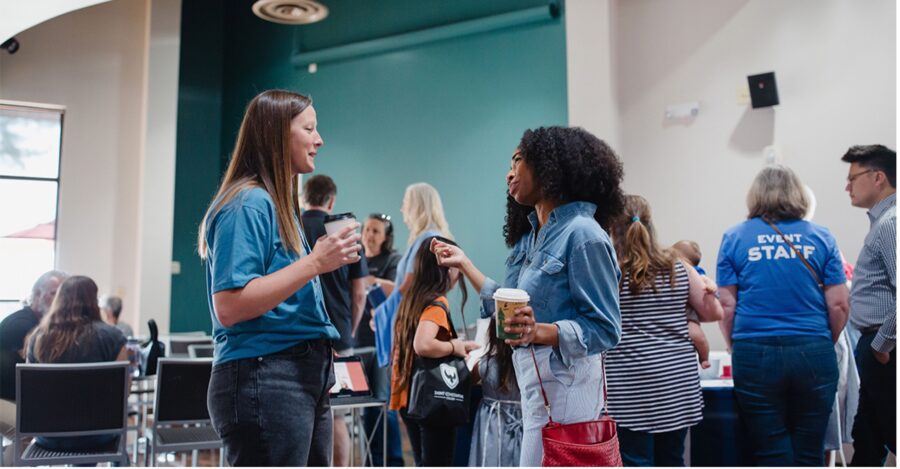Classical Conversations® Challenge I is the third of six levels in our Challenge program, preceded by Challenge B. If your student is soon to enter Challenge I, here’s an overview of what they (and you as their parent-teacher) can expect.
An Overview of Classical Conversations Challenge I
This summary of Challenge I will cover the program’s respective student ages and grade level, theme, strands, and reading list.
Challenge I Student Ages and Grade Levels
Wondering what age to enroll your child in Classical Conversations Challenge I? This program is for students ages 14 and up, meaning that Challenge I corresponds to 9th grade, or the first year of high school.
The Challenge I Theme
However, Challenge I isn’t your average 9th-grade homeschool program. Instead, students in Challenge I are encouraged to recognize this year’s theme—discipline is the cornerstone of freedom—by considering doing what they ought versus what they want. For example, as students read about great characters (both historical and fictional), take on challenging projects and assignments, and discuss new topics with their peers and trained Director in their local community, students have the opportunity to notice how effort, determination, and self-discipline make way for true freedom.
The Challenge I Strands
In every level of Challenge, students practice six strands, which can be understood as “skills.” They are logic, grammar, research, exposition, debate, and reasoning. In Challenge I, students develop these skills by learning about subjects like physical science and American literature using excellent, carefully selected materials.
Logic
In the logic strand in Challenge I, students practice critical thinking skills by studying algebra. Algebra often requires great discipline, so as students learn how to solve math problems, they are challenged to practice focus and determination. This strand also reinforces skills practiced in their studies of physical science and economics in the research and debate strands, respectively.
In their local community, Challenge I students rely on the Five Common Topics of Dialectic (definition, comparison, relationship, circumstance, and authority) to have conversations about solving math problems. This classical approach encourages students to slow down and think more deeply about algebra rather than just rushing through their math problems.
Grammar
Did you know that about fifty percent of all English words have Latin roots? And in words related to technology and science, it’s around ninety percent! In other words, studying Latin is immensely useful for understanding our own language better.
So, in the grammar strand, Challenge I students complete their study of Henle: First Year Latin by reviewing vocabulary, declensions, and conjugations covered in Challenge A and Challenge B. Repetition is the key to mastery, and this year there is an intentional focus on going deeper into English-to-Latin translations. This helps students improve their mental discipline and proficiency in Latin and English vocabulary, enabling them to communicate more effectively.
Research
Students study physical science in the Challenge I research strand, practicing essential skills like asking good questions, finding answers to those questions, and recording their findings. They learn how to read a textbook, sketch their observations, construct models of their findings, write lab reports and research papers, and conduct experiments with their peers in community. Through all these exercises, students can hone their research skills and practice the art of communicating scientific data clearly, both visually and verbally.
Exposition
Students read classic American literature and write persuasive essays for their assignments in the Challenge I exposition strand. They discuss their readings and writings with their peers, considering how they can better manage their own freedom by analyzing characters’ choices. The skills students practice in the exposition strand, of writing clearly and persuasively, are also practiced in other strands where students write a scientific research paper and prepare for formal debates.
“The purpose of reading is for the reader to experience the emotions and actions of the characters vicariously so that they can practice judgment and virtue.”
– Leigh Bortins, The Conversation
Debate
Challenge I students learn about American government and free-market economics in the debate strand. They read original documents and consider how these texts helped to shape our nation. Students also learn how to manage finances and complete a semester-long mock stock market investment project. Throughout this strand, students learn various practical skills, such as reading challenging texts, considering multiple political and economic perspectives, and clearly communicating their own opinions.
The Challenge I debate strand is also home to two intensive formal debate projects. Working in teams, students learn to collaborate in research, strategy, and presentation of arguments about relevant issues today. In doing so, they begin to learn to see topics from multiple points of view.
Reasoning
In the Challenge I reasoning strand, students practice the skills of formal logic and dialogue. Here, students are encouraged to recognize truth from falsehood and justice from injustice so they can make better decisions and learn to live wisely. In community, students discuss their short readings and assignments, as well as read Shakespeare’s The Taming of the Shrew aloud. In doing so, they learn how to seek truth and to disagree with one another gracefully.
The Challenge I Book List
The Challenge I reading list includes resources to help students recognize that discipline is the basis for experiencing true freedom. To view the Challenge II book list, visit our bookstore.
How to Enroll Your Student in Challenge I
Challenge I students are pushed to overcome new obstacles, whether writing an in-depth scientific research paper, translating English into Latin, reading original documents in their study of American government, or working together as a team with their peers in formal debates. If they practice self-discipline in their studies, they may recognize that true freedom is found through hard work and perseverance, attributes that will help them succeed next year in Challenge II.
To learn more about or to enroll your student in the Classical Conversations Challenge I program, click here.




